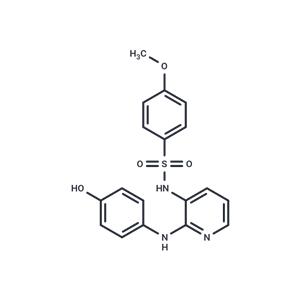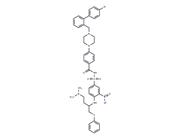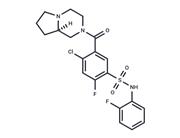| Name | ABT-751 |
| Description | ABT-751 (E7010) has been investigated for the treatment of Lung Cancer, Non-Small Cell Lung Cancer, and Non-Small-Cell Lung Cancer. |
| Cell Research | Cells, in 1640 RPMI media with FBS, are plated in triplicate onto 96 well tissue culture plates in numbers determined optimal for confluent monolayer growth (5,000 cells/well for HOS, HTB-186 Daoy; 10,000 cells/well for TC-71, RD, SK-N-AS, SK-N-DZ, LD; 30,000 cells/well for KCNR), with an automated, multichannel pipette system. Cells are incubated for 24 hours at 37 °C/5% CO2 then exposed to vehicle control (1.25% DMSO/Water), VCR (0.1–1000 nM), ABT-751 (0.1 nM–100 μM), and in 4 cell lines (SK-N-AS, KCNR, RD, TC-71) combretastatin (0.1–1000 nM) for 72 hours. Cells are fixed with trichloroacetic acid (final concentration 10%) at 4 °C, washed, then dried at room temperature, stained with SRB in 1% acetic acid and dye is then solubilized with Tris base. Optical density measurements are performed at 540 and 405 nm dual wavelengths in a Bio-Tek EL 340 UV plate reader. (Only for Reference) |
| Kinase Assay | High-throughput screening: For HTS, USP1-UAF1 activity is monitored using ubiquitin-rhodamine 110 as a substrate, where hydrolysis of the amide bond between the C-terminal glycine of ubiquitin and rhodamine results in an increase in fluorescence. The assay is miniaturized to a 4 μL volume in a 1,536-well format and is used to screen approximately 402,701 compounds in quantitative HTS mode, with each compound tested over a range of four to five concentrations. The assay shows robust performance with an average Z'factor of 0.8 throughout the screen. |
| In vitro | In the HT-29 colorectal xenograft model, ABT-751 exhibited significant antitumor activity as a monotherapy and enhanced dose-dependent growth delay when combined with 5-FU. Similarly, in the Calu-6 xenograft model, ABT-751 demonstrated notable antitumor effects at 100 and 75 mg/kg/day as a single agent and displayed an enhanced dose-dependent growth delay in combination with cisplatin. In canines with lymphoma, ABT-751 presented dose-limiting toxicity, including vomiting, diarrhea, and anorexia, with a maximum tolerated dose of 350 mg/m(2) PO q24h. |
| In vivo | ABT-751 demonstrates selective activity towards dynamic microtubules and maintains stable microtubules, explaining the persistence of acetylated and de-tyrosinated α-tubulin positive polymers at its IC90 concentration. In vitro, ABT-751 exhibits selective cytotoxicity with an IC50 of 0.6-2.6 μM in neuroblastoma cells and 0.7-4.6 μM in other solid tumor cell lines. |
| Storage | Powder: -20°C for 3 years | In solvent: -80°C for 1 year | Shipping with blue ice. |
| Solubility Information | DMSO : 37.1 mg/mL (100 mM)
Ethanol : 9.3 mg/mL (25 mM)
|
| Keywords | ABT-751 | Microtubule/Tubulin | Autophagy | ABT 751 | Inhibitor | inhibit | ABT751 | E-7010 | E 7010 |
| Inhibitors Related | Stavudine | Xylitol | Myricetin | Sodium 4-phenylbutyrate | Hydroxychloroquine | Guanidine hydrochloride | Taurine | Curcumin | Oxyresveratrol | Paeonol | Naringin | Gefitinib |
| Related Compound Libraries | Bioactive Compound Library | ReFRAME Related Library | Anti-Cancer Clinical Compound Library | Drug Repurposing Compound Library | Microtubule-Targeted Compound Library | Inhibitor Library | Anti-Aging Compound Library | Bioactive Compounds Library Max | Anti-Cancer Drug Library | Anti-Cancer Active Compound Library |

 United States
United States



